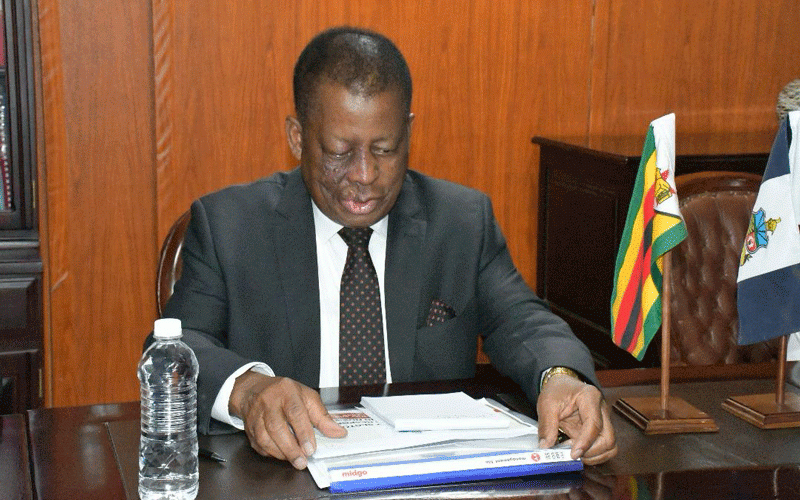
in the groove: with Fred Zindi Integrity is a rare thing in the music industry, especially in these days of no income due to the effects of the Covid-19 pandemic. Many musicians have let money override their authenticity. Some of them end up selling out their values and principled beliefs for the sake of money.
There are two distinct forms of selling out in terms of music. Forinstance, there are those musicians who let their music be used by politicians for propaganda purposes in contradiction to their apparent values. Secondly, there are those musicians who sacrifice their musical integrity due to pressure from politicians.
One incident that I witnessed was of the late Oliver Mtukudzi agonising over an invitation that had come from former president Robert Mugabe asking him to give a performance at the so-called One Million Man March, which was to be held on Africa Day in 2016.
He found it difficult to turn down this invitation from the president as he feared the repercussions, which he thought might follow if he refused to perform at this event. He knew he had been invited due to his popularity in the country.
A few weeks before this invitation, he had also been invited to State House for lunch with his wife, Daisy. So how could he refuse? He spent the whole day compiling from his catalogue of songs what to sing at the rally. He even asked several people, including me for advice on this. His final selection cheekily included songs like Kusvikira Riini Uchinzvenga Mumvuri Wako, Tsika Dzedu Dzakaendepi and Bvuma Wasakara, which got Grace Mugabe, Ignatious Chombo, Saviour Kasukuwere, Sydney Sekeramai, Jonathan Moyo and many other Zanu PF stalwarts up on their feet, dancing.
Tuku was not naïve about what was going on. He knew he was being used by politicians for propaganda purposes although he wanted to remain apolitical. He was in a dilemma. He knew that this event was likely to divide his fan base. He said: “I don’t want to end up in the same situation that Simon Chimbetu or Andy Brown found themselves.”
Of course, his die-hard fans who thought that it was his duty to perform anywhere and earn some money, saw nothing wrong with Tuku’s performance at a Zanu PF rally while others criticised him for associating with this event.
Bob Marley and the Wailers who for years had been singing about pan-Africanism, declaring their love for their ancestors’ continent, calling for unity also found themselves in a compromising political situation.
- Chamisa under fire over US$120K donation
- Mavhunga puts DeMbare into Chibuku quarterfinals
- Pension funds bet on Cabora Bassa oilfields
- Councils defy govt fire tender directive
Keep Reading
After being invited to play for the dictator, Omar Bongo in Gabon in 1980, the Wailers did not stop to ask themselves any questions when they learned that they would be performing during the birthday celebrations of Omar Bongo – who they weren’t sure whether he was the “king” or president, and didn’t care. They received a royal welcome, and their hosts were extremely attentive.
As the days went by, the Wailers discovered a sadly unequal country, in which a large part of the population lived in abject poverty. They learned that the President had just been re-elected with 99,96% of the vote.
It later dawned on the Wailers that Omar Bongo was a dictator who oppressed his people.
“We didn’t know that Omar Bongo was a dictator,” said Junior Marvin, Marley’s guitarist, bitterly. “We were innocent, so happy to be invited to Africa.”
This did not quite go down well with the ideals of a revolutionary Bob Marley, who the US Central Intelligence Agency (CIA) viewed at the time as a “subversive” figure to be kept in check.
However, Marley was able to resolve this dilemma by justifying why he went to Gabon. Bob Marley was made to believe that Omar Bongo had offered asylum to Emperor Haile Selassie whom the Rastas referred to as the great King of Kings, Lord of Lords and the conquering Lion of Judah after he had been dethroned in Ethiopia.
As Marvin put it afterwards: “If we had this information before the trip to Gabon, we certainly would have not gone. But we were naïve. We were just excited to be visiting Africa for the first time in our lives. We should have asked questions about the country we were going to, who we were playing for and how the people lived there before embarking on this journey”.
Without the backing of government or corporate institutions, many artistes are jumping through hoops for each paycheque. When one is at the end of his rope, he needs to tie a knot and hold on, but when one reaches the end of his rope, there is need to tie a knot and hang on if desperate times call.
There are some musicians who naively find themselves associating with political agendas. The situation with Jah Prayzah recording of Mudhara Vachauya and Kutonga Kwaro seems to suggest a political agenda although his camp denies it. I am not sure what the situation is with Rockford “Roki” Josphat, but there seemed to have been a political agenda behind his recording of Patati Patata with Congolese musician Koffi Olomide.
Hapless musicians have found their ticket to fame, fortune and romance by associating themselves with political agendas. Remember Bryn Taurai Mteki (I wonder if he also received one of the Polad vehicles, which were being distributed to contestants of the Presidential elections in 2018). He became famous in Zimbabwe after singing Zimbabwe Ndeyeropa and Nora, a duet he did with the late Zanu PF political commissar, Elliot Manyika.
In 1960 the American jazz musician, Louis Armstrong unwittingly became party to secret cold war manoeuvres by the US in Africa.
Armstrong, his wife and a diplomat from the US embassy were out for dinner in a restaurant in Léopoldville, capital of the newly independent Congo.
The trumpeter, singer and band leader, nicknamed “Satchmo” as a child, was in the middle of a tour of Africa, organised and sponsored by the State Department in a bid to improve the image of the US in dozens of countries which had just won freedom from colonial regimes.
What Armstrong, the naïve musician, did not know was that his host that night in November 1960 was not the political attaché as described, but the head of the CIA in Congo. He was also totally unaware of how his fame had allowed the spy who was making small talk across the starters to gain crucial information that would facilitate some of the most controversial operations of the entire cold war.
According to Susan Williams who conducted research for the United Nations in London: “Armstrong was basically a Trojan horse for the CIA. He was brought in to serve an interest that was completely contrary to his own sense of what was right or wrong. If he had known, he would have been horrified.”
Documents found in the archives of the United Nations by Williams during five years of research strongly suggest that Armstrong’s host, CIA station chief Larry Devlin, and other US intelligence officers posted to Congo used the cover of the musicians’s visit to get access to the strategically important and very wealthy province of Katanga, which had recently seceded. The US, though sympathetic to the agenda of the province’s leader, had not officially recognised the self-declared government there.
There was much of interest to the CIA in Katanga, ranging from senior officials with whom they could not otherwise meet to crucial mining infrastructure, with 1 500 tonnes of uranium and vast potential to procure more. Armstrong’s tour to Katanga was the perfect opportunity, so Devlin and others flew down from the capital with the musician and his famous band.
“They needed a cover, and this gave them one,” said Williams.
The CIA in the Congo, led by Devlin, was trying to kill the Congo’s first democratically elected prime minister, 35-year-old Patrice Lumumba, fearful that he would lead the country into the Soviet camp.
Just a mile or so from where Armstrong and Devlin had dined, the charismatic Lumumba was being held prisoner in his official residence by soldiers loyal to Joseph Désiré Mobutu, the young military chief with a close working relationship with the CIA, who had effectively seized power some weeks earlier.
Within two months of Armstrong’s tour, Lumumba was murdered in Katanga by officials of the breakaway province and police officers from Belgium. Mobutu would later consolidate his hold on Congo and become a loyal US client.
On realising this afterwards, Armstrong had this to say: “Though I represent the government, the government don’t represent some policies I’m for.”
He was horrified.
In 1962, a tip from a CIA spy to officials of the racist, repressive apartheid regime in South Africa may have led to the arrest of Nelson Mandela which led to his 27 years in prison. The agency has also been blamed for the overthrow of Ghana’s first president, Kwame Nkrumah, in a military coup in 1966.
Feedback: [email protected]











